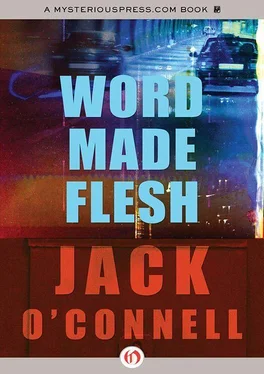“Which story?”
“The only one that’s left to me.”
A pause as they stare at each other. Then Gilrein asks, “Could you tell it to me?”
“Are you sure you want to hear?”
And though he’s not at all sure, Gilrein nods his assent.
You are here as a convenient pair of ears, Gilrein. Make no mistake, it might as well have been any one of my silent passengers in the rear of my taxi. Or even the orderlies who broke my rib strapping me to the table where they injected me with their controlling fluids. The joke is very likely on them, yes? My liver will not process their chemicals. I am not one of them. I am not like you. I am an exile. A true exile. Not like you, Gilrein. Yes, I know, I’ve watched and listened. I am aware you fancy yourself the outsider. But it’s an act of vanity, mister. For you, it’s a pose, a way of killing time, as much as driving the taxi or drinking coffee in the Visitation.
You want a story, Mister Taxi-Boy. Very well then, you listen to me now. As you have never listened before. You listen to the end of my story and you memorize it. You are my receptacle. You are the only form of media left to me. You owe me this act, to become the listener, to give me your ears so that I might fill them like a satchel. You listen, Gilrein. As atonement for your arrogance.
When the Censor emerged from Haus Levi, the manuscript tucked under his coat, crews of latex-clad sanitation workers were sorting through the spoils, the booty of jewelry and knicknacks and wallets, tossing the better goods into money sacks imprinted with the Treasury’s seal, tossing photographs and clothing into thriving fire pits. A secondary crew was hosing the tenements down with liquid accelerant from tanks strapped to their backs. A phalanx of heavy machinery waited outside the mouth of the Schiller, behind the walls of cyclone fencing, cranes and backhoes idling under their drivers who were annoyed with the delay but appeased by the overtime wage. Meyrink called a foreperson over and asked for an estimated completion time for the entire project. The young woman consulted a clipboard and guessed it would be dawn before they could be ready to start burning and leveling the tenements.
Meyrink was barely listening. He approached a vice-chancellor who was sipping kava beside the Obliterator and, mumbling something about exhaustion, relinquished command.
Not wanting to take a staff car and aware that all the taxis had been rerouted for the night, Meyrink walked the three miles to his home, a nondescript town house in a bourgeois neighborhood. The walk allowed him time to think and build the correct degree of relish and expectation he felt the coming days deserved. An evolution of this magnitude should be acknowledged and embraced, received by every sensory port available, no matter how painful.
His deputies were waiting by the curb in a Ministry jeep. Meyrink stopped by the driver’s window and exchanged with Varnbuler his house keys for the generous bonus that would buy their discretion.
“Any problems?” Meyrink asked.
Varnbuler shook his head.
“Is she—”
“She’s awake,” the deputy assured him.
“And you—”
“Just as always,” Varnbuler interrupted for the last time.
Meyrink nodded and gestured that they could leave. He waited for the jeep to vanish around the bend of Morgenstern Road, then walked up the stair to his front door, barely able to contain the intensity of some new glandular response that resembled both glee and fury. He let himself into the foyer, made himself stop and pick up the mail that had been pushed through the slot, willed himself to sort and glance at a succession of bills, solicitations, and a letter from his mother on holiday in Matliary. He stopped in the pantry and poured some sherry, inspecting the sideboard to see that the housekeeper had done a thorough dusting. Next, he took his drink upstairs to the bedroom and removed the manuscript, placing it delicately on the bed as he changed out of his uniform, then reattired himself in tennis shoes, work pants, sweater, lab smock, and skiving apron. He studied himself in the mirror, stepped into the bathroom to slick down his hair with a wash of tap water. He dried his hands exhaustively before picking up the papers. Finally, unable to further postpone the culmination of his yearnings, he carried the gospel down to the cellar of the house and into the hobby room.
He threw open the door to find Alicia conscious, naked, and chained to a large brass hook that protruded from the center of the ceiling. Just as his deputy had promised.
A piece of silvery-gray duct tape was bound across the girl’s mouth. She stared at Meyrink, silent in terror and confusion. He stepped directly in front of her and though she tried to recoil, she could only bow her body back so far.
Meyrink held the stack of mismatched papers up at chest level and said, “In the beginning was the word, yes?”
Alicia mouthed something that was obscured by the tape.
Three of the room’s walls were fitted with oak worktables of differing widths and heights, their surfaces inlaid with ship’s linoleum and Formica. Each table was fitted with Anglepoise lamps of higher than normal intensity and two of the tables featured an expensive brand of German magnifying glass on bendable mounts protruding from sockets cut into the wood. Above each table sat a series of pegboards and cupboards and cabinets holding an impressive and long-assembled collection of tools, implements, and utensils including tenson saws, carpenter’s squares, band nippers, strops, awls, G-clamps, trindles, blunt-ended shears, back scrapers, sewing keys, rods, riveting sets, light hammers, backing hammers, loaded sticks, gilder’s tips, bone folders, chisels, bodkins, backing boards, dog-toothed burnishers, piercers, pins, paring stones, steel rulers, sandpaper blocks, mini-vises, and, perhaps, the most impressive collection of cutlery in central Maisel — knives and scalpels and lancets and razors and blades imported from all over the globe, some antiques and some custom-made, some known mainly to common village cobblers of Old Bohemia, others used solely by research surgeons in clinics unchartered by the republic’s Ministry of Health. But all of the metal kept meticulously polished and obsessively honed.
At the wall-head of the central table was a set of three glue pots set in a heated water jacket. On either side of the pots was a line of small cans and glasses containing an assortment of brushes — glue brushes, paste brushes, watercolor flood brushes, sable-hair brushes, hog’s-hair brushes, natural thistle brushes.
Beneath each table was a leather-topped tavern stool on rubber-tipped legs. At the far end of the room was a standing iron board cutter with a guillotine arm that could slide through anything reasonable, an antique English standing press, and a smaller, solid iron nipping press mounted atop a matching iron bench. A variety of sewing frames leaned against the roughstone wall, resting on the floor next to a large, black-wood plan chest with narrow drawers. The top drawers were stocked with papers — decorative marbles and Japanese tissues and pricey Ingres. Wrapping papers and blotting papers and art papers and writing papers and drawing papers. All in a spectrum of colors, weights, grains, and pH values. The bottom drawers were stocked with a supply of preskived leathers in various qualities.
Wire drying lines were strung wall-to-wall behind Alicia’s head. The floor beneath her bare feet was poured concrete fitted in the center with a grate-covered drain. There were no windows. Adjoining the room, there was a private lavatory which supplied the running water. There was also a walk-in closet from which the doors had been removed and the interior remade with fitted shelving that displayed an impressive assortment of books in pristine and matching bindings. In the middle of the closet area was a wood-and-glass display case filled with two slim books bound in an ugly brownish-purple covering. Their installation inside the hermetic case was the only indication of their status above the shelved volumes.
Читать дальше












